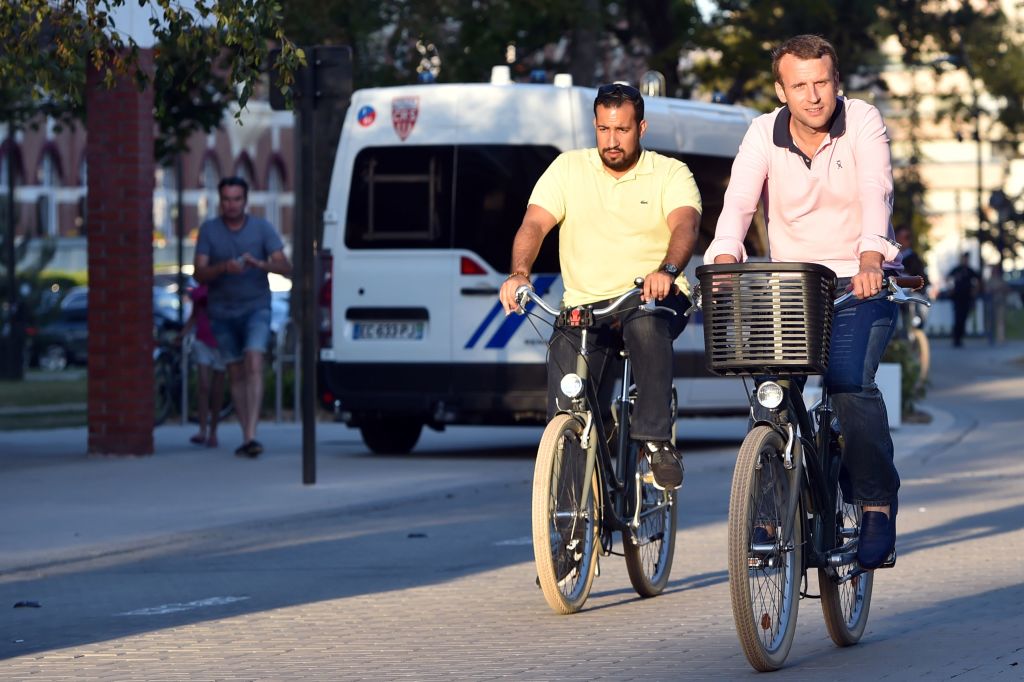The feel-good factor Emmanuel Macron hoped would surge through France following their World Cup win has failed to materialise. The president milked the success for all it was worth but he has been swiftly brought down to earth with a bump. It was actually more of a thump, administered by his now ex-chief bodyguard Alexandre Benalla, who was caught on camera beating a protestor while dressed as a policeman during a May Day march earlier this year.
Since the story broke eight days ago, it has dominated the French media. Had the president’s people come clean the day the footage was first broadcast by Le Monde, the story wouldn’t have developed in the way that it has. Instead, the Élysée Palace tried to lie its way out of the mess until eventually Macron himself was forced to address the issue. “What happened on May 1 is terrible, serious, and for me it was a disappointment and a betrayal,” he said in an address to his MPs on Tuesday.
Macron’s initial silence on Benalla’s behaviour allowed his enemies to create their own narrative. Jean-Luc Mélenchon, the far-left leader, likened the scandal to Watergate, while newspapers started to whisper over the weekend that the bodyguard had something on Macron. Not true, said the president on Tuesday. “Alexandre Benalla has never had the nuclear codes,” he joked. ” Benalla is not my lover.” But beneath the quips burns a deep resentment on the part of the president at the way the story has veered out of his control. “We have a press that no longer seeks truth,” he said. “Are (the pictures) shown with the desire to seek the truth and to present facts in a balanced manner?” He believed not.
Falling back on the ‘fake news’ formula won’t wash with the French public. They might be tiring of the story as it enters its second week, but for many the scandal is symptomatic of a presidency that has run out of steam. An opinion poll published this week revealed that 60 per cent of the public are dissatisfied with their leader, the highest number since he took office in May last year. Contrast that figure with a poll in the middle of April in which 58 per cent of people canvassed approved of their president. So why the drop?
I’ve just spent a fortnight hiking in the Pyrenees, spending the evenings in gîtes where guests ate at a communal table and the conversation was as plentiful as the food. Most of the people I spoke to don’t like Macron but they consider him the best of a bad bunch. “France needs reforming,” one young man said. “But Macron’s mistake is he’s reforming too quickly. He’s frightening people.”
For the first year of his presidency, Macron was a human tornado, ripping through traditions and practices that have remained untouched for decades. Barely a week went by without another bold initiative emanating from the Élysée promising to reform the country for the better; and yet unemployment in the first quarter of 2018 has risen 0.2 per cent to 9.2 per cent and economic growth slowed to 0.3 per cent compared to 0.7 per cent for the same period in 2017. The government has asked for patience – somewhat rich coming from a president who appears to have little of this himself – but we live in a world where people expect instant results. They haven’t been forthcoming and frustration is mounting.
If domestically he is a disappointment, Macron has also failed to live up to expectations on the world stage. He’s wined and dined most of the world’s leaders in the last fifteen months but he has little to show for his flattery, most notably with Donald Trump. Macron thought he had the measure of the American president but as he discovered on his state visit to Washington in April, no amount of earnest advice on issues such as climate change and the Iran nuclear deal could alter his position.
Macron’s plan, first aired a year ago, to establish ‘hot-spots’ in Libya to deal with asylum requests, has got nowhere; and in the meantime he’s angered the governments of Italy, Poland and Hungary with comments that have ranged from the arrogant to the hypocritical. He’s also got nowhere trying to persuade Angela Merkel to buy into his vision of where Europe should head.
It all adds up to a picture of a president whose early promise is dissipating, and while his main political opponents are still in disarray they’ve nonetheless seized on the Benalla story to create what Le Figaro describes as the “first major crisis of his presidency”. Will it cause any lasting damage? Probably not but it’s shattered his squeaky-clean image, carefully nurtured by his vast team of spin doctors.
Macron is not in fact infallible and, like a boxer on the ropes desperate for the bell, the August holiday can’t come soon enough. He’ll use the time to regroup and refocus, conscious that the autumn heralds the start of campaigning for the European elections next May, the first serious test of his presidency. His enemies are emboldened and the likes of Marine Le Pen, Laurent Wauquiez and Melenchon – all Eurosceptics – see the elections as a great opportunity to capitalise on the anti-Brussels sentiment sweeping the continent and at the same time land some Benalla-like blows on the president.







Comments